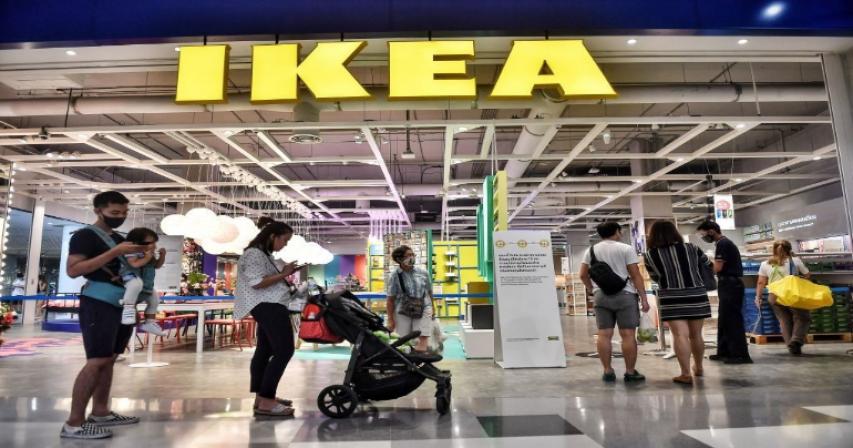Ikea boss warns tariffs will lead to higher prices
- 4 years ago

The boss of Ikea has told the BBC he fears that global trade tensions will lead to higher prices for customers.
Jesper Brodin, chief executive of Ingka Group, which is the furniture giant's holding company, said imposing restrictions such as tariffs "normally doesn't benefit the ordinary people".
Many countries have imposed new tariffs and other restrictions on imports in recent years.
The trend was accentuated by the US under former President Donald Trump.
And the World Trade Organization says even before the pandemic, trade restrictions were on the rise.
"Normally it leads to cost increases on the product in the end of the day. And there are some concerns about that going on, not only in India but globally," Mr Brodin said in a BBC interview.
Ikea has invested billions of dollars in India in ambitious expansion plans, but it imports the majority of the products it sells in the country, from furniture to kitchenware.
That means it has fallen foul of higher import taxes imposed last year by Narendra Modi's government as part of his self-reliant India drive, putting it at a disadvantage when competing with domestic rivals.
As in other countries, pricing is crucial and Mr Brodin suggests buying stock locally could help. "We are on the move to drive optimal sourcing and find ways with governments and within the company to try to mitigate that."
Climate change responsibility
Wherever those products come from, Mr Brodin is forthright about the need to make them in a way that addresses the challenges of climate change and sustainability.
"I actually think Covid is teaching us to take the collective human challenges in a more serious way and a more responsible way," he says.
He explains that recycling will become ever more important in minimising the impact consumption has on the planet. "Ikea's mattresses in the future cannot be based on virgin material. We need to find smarter ways.
"We will be more people to share the resources on the planet. So it's both the right thing to do, morally, ethically, but also from a business perspective."
Ikea will not be the only company adhering to these values, he predicts: "This is not charity, this is the new economy 2.0, the new business model of the world."
Forced labour
Another headache for many multinationals is how to ensure forced labour is kept out of their supply chains. A recent BBC investigation raised questions about cotton from China's Xinjiang region, although not that used by Ikea. China's government denies there is any forced labour.
The US is among those governments trying to tackle the issue. This week, the Biden administration raised the prospect of new laws to "enhance corporate accountability".
Mr Brodin agrees with the need for companies to take responsibility: "Here is an area where we need to work with common standards in the world."
"There need to be verifiable methods" to check supply chains, he adds. Ikea works with external companies to review its own checks and Mr Brodin says the Swedish company is quick to act if necessary.
"Can we guarantee that there is never an accident or a breach in that? No, but if it happens, we will catch it normally ourselves before anybody else does. And we are able to correct it."
Online survival
Store closures have been another burden for Ikea's boss. In all, 80% of the 445 outlets worldwide have been closed at some point over the last year, but Mr Brodin doesn't think the coronavirus pandemic will change everything about retail forever.
He says customers still value seeing products for themselves and getting in-store advice. "Most people still want to sit on the sofa before they buy it."
Mr Brodin is grateful that the company invested heavily in selling online before the pandemic: "Literally we didn't know how much we would need it.
"Even with that, at the start of the pandemic, there was a period where we thought we would be in the red for the first time in our 75-year history."
In the end, profits fell 29% to $1.7bn (£1.2bn) in the year to the end of August.
The strength of those online sales, Mr Brodin says, led to a "very interesting discussion. Is it morally right for us to accept furlough [payments for staff wages] when we are actually going to head towards some sort of a profit?"
"In the end of the day, we decided it was wrong," he says, and money was returned to governments in several countries.
Mr Brodin senses governments will need to support their economies for a while yet.
Store visits growing
"We are hopeful that autumn will be some sort of return to the new normal," Mr Brodin says, but he cautions: "We need to be prepared for the worst."
However, plans to expand with 50 new stores worldwide are not on hold, even though "Covid-19 has amplified the whole change process".
Those changes include new in-store safety measures, and they may be paying off.
In a signal of hope for retailers who have struggled through the pandemic, Mr Brodin says that where government restrictions have been lifted and shops could reopen, "we were actually surprised by the interest of coming back to stores."
He says: "In most of our countries, we have more people after Corona visiting us than before."
Source: BBC
Comments